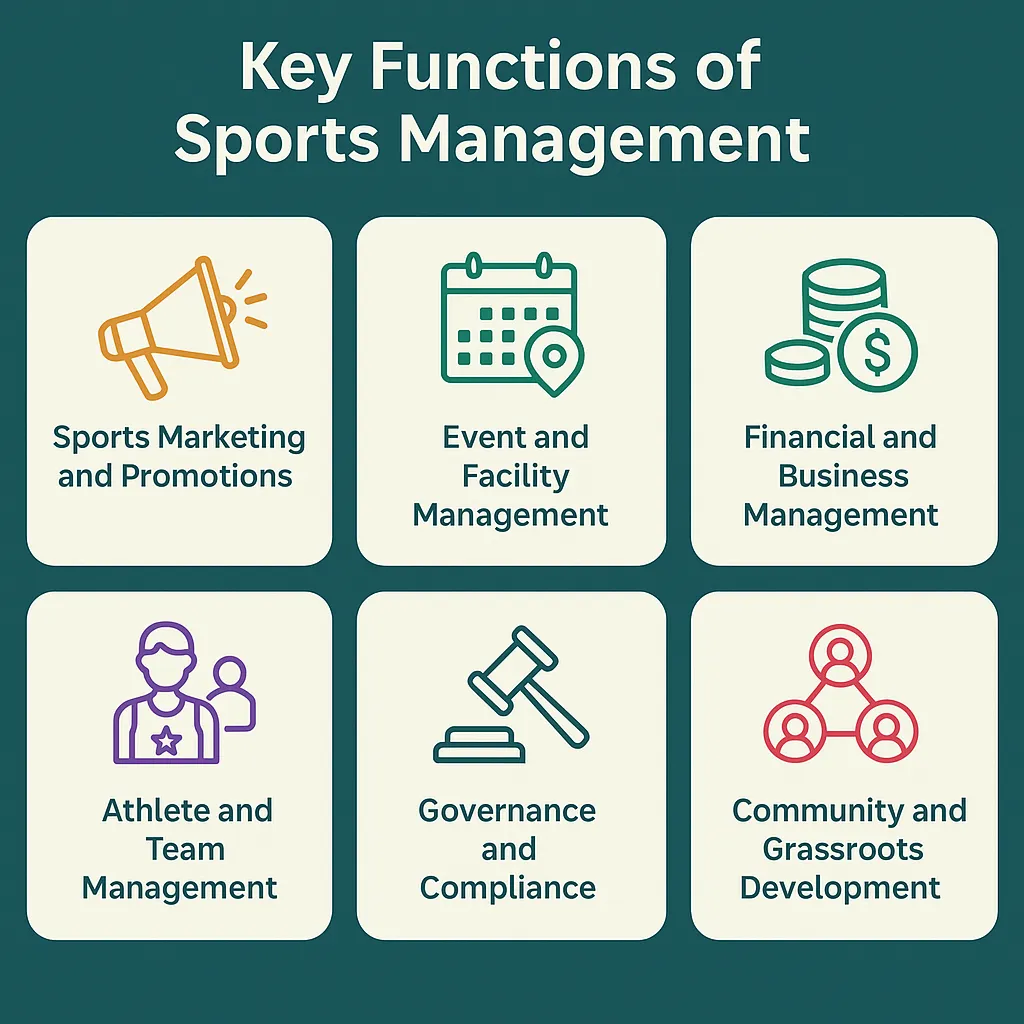
Executive Summary
Sports management is the field that deals with the business aspects of sports and recreation. It combines knowledge of business, marketing, law, finance, and organizational management to plan, organize, and oversee the operations of sports organizations, teams, events, and facilities.
With the global sports industry growing into a multi-billion-dollar sector, sports management has become a critical discipline for ensuring that sports entities operate efficiently, generate revenue, engage fans, and maintain high standards of performance.
This guide explores what sports management is, its importance, functions, career paths, challenges, and emerging trends in the field, providing a comprehensive understanding of how sports management drives success in the athletic world.
Table of Content
Introduction
Sports are more than just games—they are an intricate ecosystem of athletes, teams, events, facilities, sponsors, fans, and media. Behind the scenes, sports management ensures that every aspect runs smoothly, from event planning and marketing to finance and governance.
Sports management professionals are responsible for creating value in the sports industry, fostering athlete development, ensuring legal compliance, and maximizing revenue streams. The field blends traditional business practices with the unique dynamics of sports, making it a fascinating and dynamic area of study and practice.
The Concept of Sports Management
Sports management refers to the administration, organization, and leadership of sports organizations and activities. It involves planning, executing, and supervising sports programs, events, teams, and facilities to achieve organizational goals, maintain operational efficiency, and deliver positive experiences for athletes, fans, and sponsors.
Key aspects of sports management include:
- Business Operations – Managing budgets, revenue streams, and overall financial health.
- Marketing and Promotion – Building fan engagement, brand loyalty, and sponsorship opportunities.
- Event Management – Planning, coordinating, and executing sports events at all levels.
- Athlete and Team Management – Supporting performance, career development, and well-being.
- Facility and Venue Management – Ensuring safe, accessible, and well-maintained sports facilities.
Importance of Sports Management
Effective sports management is vital for several reasons:
1. Professionalization of Sports
- Standardizes practices and processes in sports organizations.
- Ensures professionalism in operations, governance, and performance.
2. Revenue Generation
- Develops sponsorships, ticket sales, merchandising, and media rights.
- Enhances the financial sustainability of sports organizations.
3. Fan Engagement
- Creates marketing strategies and events that attract and retain fans.
- Leverages social media, promotions, and fan experiences to boost loyalty.
4. Athlete Support and Development
- Provides career guidance, training resources, and welfare programs.
- Ensures athletes’ physical, mental, and financial well-being.
5. Operational Efficiency
- Optimizes scheduling, logistics, and staffing to run events and organizations smoothly.
- Reduces risks and ensures safety and compliance in sports operations.
6. Industry Growth
- Drives innovation, international exposure, and professional opportunities.
- Expands the global sports industry, creating economic and cultural value.
Recommended Course: Sports Marketing
If you’re interested in the promotional and branding side of sports, the Sports Marketing Course is a great next step. It will help you understand how to attract fans, manage sponsorships, and build strong sports brands.
A perfect choice to deepen your expertise in sports management.
Key Functions of Sports Management
Sports management encompasses multiple functions, each contributing to the success of sports organizations and events:

1. Sports Marketing and Promotions
- Branding teams, leagues, and events to attract fans and sponsors.
- Developing campaigns through traditional media, digital platforms, and influencer partnerships.
- Enhancing fan engagement through loyalty programs, merchandise, and experiences.
2. Event and Facility Management
- Planning and executing sports events at local, national, and international levels.
- Managing stadiums, arenas, and sports facilities to provide safe, high-quality experiences.
- Overseeing logistics, ticketing, security, and operations for events.
3. Financial and Business Management
- Budgeting, forecasting, and managing revenue streams.
- Negotiating sponsorship deals, media contracts, and merchandise licensing.
- Ensuring compliance with financial regulations and reporting requirements.
4. Athlete and Team Management
- Recruiting, developing, and supporting athletes.
- Handling contracts, endorsements, and career planning.
- Promoting athlete health, nutrition, and mental well-being.
5. Governance and Compliance
- Ensuring adherence to local, national, and international sports regulations.
- Managing ethical considerations, anti-doping policies, and fair play initiatives.
- Coordinating with governing bodies, associations, and legal authorities.
6. Community and Grassroots Development
- Promoting sports participation at community and youth levels.
- Organizing programs to identify and nurture emerging talent.
- Engaging with schools, clubs, and social initiatives to promote healthy lifestyles.
Sports management connects with several other fields that focus on leadership, organization, and performance optimization.
For a deeper understanding of how structured management drives success, explore What Is Project Management? and What is agile project management?.
People are the foundation of any successful sports organization. Learn how workforce strategies shape performance through What Is Human Capital Management (HCM)? and What Is Talent Management?.
Many sports teams rely on consulting expertise to improve operations and profitability. To explore this further, read What Is Management Consulting?.
Sports organizations also use customer engagement systems similar to corporate sectors — discover how through What Is Customer Relationship Management (CRM)?.
For insights into broader operational excellence, check out What is program management? and What Is Workforce Management?
If you’re interested in how strategic care and well-being play a role in performance — both in sports and healthcare — explore What Is Pain Management?.
Career Paths in Sports Management
Sports management offers diverse career opportunities across business, administration, marketing, and event management in the sports industry:
1. Sports Marketing Manager
- Develops marketing campaigns, sponsorships, and fan engagement strategies.
2. Event Manager / Coordinator
- Plans, organizes, and executes sports events, tournaments, and competitions.
3. Athlete Manager / Agent
- Represents athletes, negotiates contracts, and manages sponsorships.
4. Sports Analyst / Statistician
- Evaluates team performance, player statistics, and trends for coaching and management decisions.
5. Facility Manager
- Oversees stadiums, training centers, and sports complexes.
6. Fitness and Performance Manager
- Designs athlete training programs, nutrition plans, and performance monitoring.
7. Sports Broadcaster / Media Specialist
- Covers sports events, manages social media presence, and produces content for fans.
8. Sports Law Specialist
- Provides legal guidance on contracts, sponsorships, disputes, and compliance.
9. Recreational / Community Sports Manager
- Manages local sports programs, clubs, and grassroots initiatives.
Educational Requirements and Skills
A career in sports management typically requires a combination of education, skills, and practical experience:
Educational Pathways
- Bachelor’s Degree: Sports Management, Business Administration, Marketing, or related fields.
- Master’s Degree / MBA: Advanced knowledge in sports administration, finance, and strategy.
- Certifications: Event management, coaching, sports marketing, or data analytics certifications.
Key Skills
- Leadership and teamwork
- Communication and negotiation
- Financial management and budgeting
- Strategic planning and decision-making
- Marketing and branding
- Knowledge of sports laws and ethics
- Data analysis and performance monitoring
- Crisis management and problem-solving
Challenges in Sports Management
Sports management professionals face a variety of challenges:
- Financial Constraints: Limited budgets in smaller clubs or events.
- Sponsorship and Revenue Generation: Securing and retaining sponsors in a competitive market.
- Athlete Management: Balancing performance demands with athlete welfare.
- Regulatory Compliance: Keeping up with legal, ethical, and governance standards.
- Fan Engagement: Meeting evolving fan expectations across digital platforms.
- Event Logistics: Coordinating multiple stakeholders, venues, and schedules.
- Globalization: Managing international tournaments, cross-border transfers, and cultural differences.
Trends Shaping Sports Management
Sports management is evolving rapidly due to technological advancements and changing consumer behavior:

1. Digital Transformation
- Use of apps, social media, and streaming platforms to engage fans and manage operations.
2. Data Analytics and Performance Metrics
- Leveraging big data to optimize athlete performance, ticket sales, and marketing campaigns.
3. Esports and Virtual Sports
- Expanding opportunities in competitive gaming and online sports events.
4. Sustainability Initiatives
- Green stadiums, eco-friendly events, and socially responsible practices.
5. Globalization of Sports
- International tournaments, athlete transfers, and cross-cultural sponsorships.
6. Health and Safety Protocols
- Enhanced focus on athlete well-being, injury prevention, and fan safety in events.
Tools and Technologies in Sports Management
Technology plays a key role in modern sports management:
- CRM and Fan Engagement Software: Salesforce, HubSpot for fan relationship management.
- Event Management Platforms: Eventbrite, Cvent for ticketing and logistics.
- Performance Analysis Tools: Sportscode, Hudl, Catapult for athlete analytics.
- Financial Management Software: QuickBooks, SAP for budgeting and revenue tracking.
- Social Media and Marketing Tools: Hootsuite, Buffer for campaigns and engagement.
- Facility Management Systems: Automated scheduling, booking, and maintenance tools.
Real-World Applications
Sports management applies across multiple levels and types of sports:
1. Professional Sports Teams
- Managing team operations, contracts, and sponsorships.
2. International Sports Organizations
- Overseeing global tournaments, regulations, and governance.
3. Community and Grassroots Programs
- Encouraging participation, training, and local competitions.
4. Recreational Sports Facilities
- Operating gyms, fitness centers, and local clubs efficiently.
5. Sports Media and Marketing
- Promoting events, athletes, and teams to drive engagement and revenue.
Common Misconceptions
- Sports Management is Only About Playing Sports: It primarily focuses on business, administration, and operations.
- Athletes Don’t Need Managers: Professional management improves performance, contracts, and sponsorships.
- Small Organizations Don’t Need Sports Management: Even local clubs benefit from structured management practices.
- It’s Easy to Work in Sports: Requires strategic thinking, multitasking, and business acumen.
Steps to Become a Sports Manager
- Pursue Relevant Education – Enroll in sports management, business, or marketing programs.
- Gain Practical Experience – Internships, volunteering, or working in sports events and clubs.
- Develop Key Skills – Leadership, communication, analytics, and marketing skills.
- Specialize – Choose a focus area like event management, athlete management, or marketing.
- Build a Network – Connect with professionals, coaches, and sports organizations.
- Stay Updated – Follow trends, technology, and regulatory changes in the sports industry.
- Seek Certification – Optional certifications in sports management, event management, or analytics.
Future of Sports Management
The field is expected to grow and evolve due to:
- Increased commercialization and professionalization of sports globally.
- Expansion of women’s sports and minority representation.
- Integration of AI, VR, and analytics in performance and fan engagement.
- Sustainable practices and eco-conscious event management.
- Continued growth of esports and digital sports entertainment.
Conclusion
Sports management is a dynamic and multidisciplinary field that merges business, administration, and athletic excellence. It ensures that sports organizations, teams, events, and facilities operate efficiently, athletes receive support, and fans enjoy engaging experiences.
With opportunities across marketing, event planning, finance, athlete management, and media, sports management is essential for driving growth, professionalism, and innovation in the global sports industry. Whether at the grassroots or professional level, effective sports management creates value, fosters talent, and ensures the long-term success of sports organizations.


